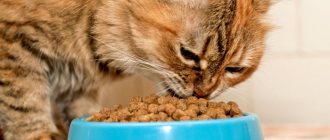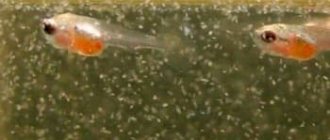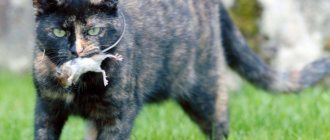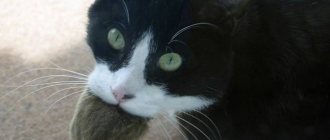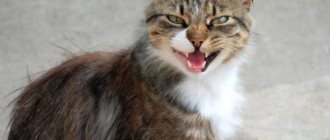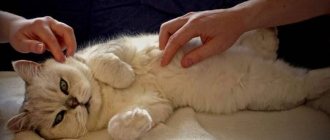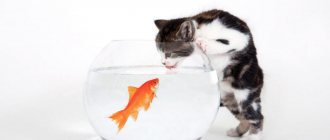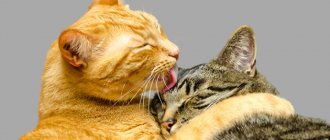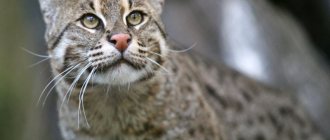Cats have long begun to become interior items, and not dangerous predators for all living creatures. However, quite often people get cats precisely to get rid of rodents, and only secondarily for pleasant company. Do you need to choose a specific breed for this, or can you raise a hunter yourself? This issue will be discussed in the article.
Hunting instinct in cats
The term "hunting instinct" describes an animal's level of interest, on a natural level, in hunting live prey. Despite the fact that this concept is usually associated with dogs, it can be said that it is still more developed in cats. A dog, by order of its owner, can restrain impulses to hunt, or, conversely, release it. The cat does not obey such commands, and even after being at home for a long time, it is able to restore its abilities and desire to hunt. Probably, the fact that at home you can rarely see a cat hunting a mouse is due to the fact that animals simply do not need to waste energy to get food - they can only do it out of interest, if they have it.
All cats have a hunting instinct.
The way the hunting instinct manifests itself can be seen in games with a pet. The cat freezes, begins to sway before throwing, tensing its entire body, and if it fails to reach the target, it expresses its dissatisfaction with its voice. How developed the instinct can be checked by scratching your finger across the surface: the faster the animal reacts to sound, the better developed its hunting instinct.
So what determines whether your pet will show this instinct?
The role of living conditions
Living not in a private house, but in an apartment, a cat often catches mice for entertainment, not profit. Yard cats, or those who live in a private house, are better accustomed to hunting for food. These cats are more familiar with nature and the sight of a mouse will not cause them any confusion. Although, it is worth noting that instincts developed over centuries are not so easy to suppress, and over time, under certain conditions, even very domestic cats can become predators.
Still from the cartoon “Cinderella 2: Dreams Come True”
The importance of a pet's appearance
Appearance is very important when choosing a hunter cat. First, pay attention to the color of the coat - it should serve as camouflage. For example, discreet colors are suitable for our nature - gray, brown or variegated. Also, not only the color, but also the length of the coat plays an important role: too long can interfere with hunting. In addition, when wet, its strong odor can scare away potential victims. And, of course, the mustache is the natural locator of your home hunter. With their help, the animal navigates in the dark, catches air vibrations and estimates the distance to prey. And therefore the rule “more is better” works here.
Predator on the hunt
Heredity and upbringing
Heredity and upbringing play a huge role not only among people, but also in the animal world. An experiment conducted quite a long time ago proved this. To conduct it, two cat families were chosen: purebred and domestic. The parents of these families had their kittens replaced. Thus, purebred cats raised yard kittens, and yard parents raised purebred ones. Yard cats began to teach their children how to hunt in natural conditions, while for purebred cats the whole process was like a game. As a result, purebred kittens became excellent hunters, while domestic kittens were significantly inferior to them in this regard.
The cat is entrusted with caring not only for itself, but also for its offspring.
Of course, it cannot be denied that heredity is very important, but as a result of inaction, even pronounced instincts can be suppressed. Therefore, if you need a hunter cat, it is better to pay attention to yard animals. Well, if the breed is important to you, a good alternative would be to buy a kitten from a family that lives outside the city and has access to a spacious area.
Do they catch mice?
Representatives of the breed do not have hunter instincts, and therefore, if they catch a mouse, it is only for play.
Choosing a fold-eared cat to get rid of rodents is not the best idea. These are not Thai hunter cats, which are focused on finding prey and destroying it. The Scottish feline can catch a small mouse, but he will be scared of a rat and hide in a corner
It is worth paying attention to the individual character traits of the animal. A pet torpedo will be interested in hunting and will look for an opportunity to frolic; a lout will not be interested in such an activity
A domestic purebred cat can easily be poisoned by a caught mouse, since he is accustomed and accustomed to home-cooked food.
Which ones are caught?
The role of the best mouse hunter was taken over by outbred cats, who were born on the street and raised by their mother, who hunted to feed her offspring. It is in their upbringing that this is the only way to get food. When choosing a cat solely for the function of catching mice, people focus on aggressive breeds (British, Siamese, Maine Coons). According to numerous testimonies from owners, British cats are capable of catching and destroying even a rat.
Cat or cat: who is the better hunter?
When asked who, a cat or a female cat, is better at catching mice, the answer is most often given in favor of cats. Males often favor the reproductive instinct over the hunting instinct, while cats are more inclined to search for food (although there are, of course, exceptions). In addition, cats are engaged in teaching their offspring to hunt. Considering this circumstance, they have twice as much practice as cats.
Home Hunter
It is believed that stray cats are the best hunters, since they need to feed both themselves and their offspring. However, even pets will teach their kittens hunting skills.
According to some data, cats hunt most actively before the approach of estrus, about once a quarter (cats that do not need to feed themselves - depending on the mood). Thus, three to four times a year a rodent raid can be organized. It is important to remember here that for a cat, prey is not distinguished between friends and foes, and therefore you need to either carefully protect domestic birds and small animals, or properly educate your hunter.
It is better to feed one cat than a hundred mice (proverb)
And not only to feed, but also to protect from possible dangers. The owner of a rat-catching cat should not skimp on vaccinations, deworming and other preventive measures
Treatment for fleas and worms - all this is extremely important, because a cat that catches wild rodents is daily exposed to the risk of becoming infected with parasites and viruses. “Apartment” mice and rats can be poisoned by slow-acting arsenic and other poisons: eating such prey leads to serious poisoning and sometimes to the death of the pet
Therefore, you can only allow a cat to eat mice if you live in the countryside, and if you know for sure that your neighbors do not use pesticides to control rodents.
How to raise a hunter
Even breeds in which the hunting instinct is very pronounced, or with heredity conducive to this, will not necessarily become excellent hunters without the proper conditions and education. To help develop it, we recommend paying attention to the following techniques:
- Encouragement always plays into the hands of teachers. Praise your pet when he catches prey (but not, of course, if his prey was one of your other pets);
- One might assume that if an animal has nothing to eat, it will inevitably become a hunter, but this is not so. If you start starving your cat, most likely he will start stealing and searching garbage dumps, but will not join in the hunt. Feed your pet often, but in small portions. The bowl should not be kept full all the time;
- Games are a good stimulant. By playing, you will help the kitten develop the hunting instinct, but you should not get too carried away with this, because by fully satisfying the need for hunting with fun, you can discourage the cat from switching his attention to mice and other pests. As one of the options for developing the hunting instinct, you can use a live mouse, which you yourself will give to the kitten. You can pick it up only after the pet has played with it and strangled it.
Little hunter
The optimal age at which you can take a kitten from its mother is four to five months. By this time, your pet can already learn the basics of hunting science from its parent. Also, the future hunter needs to be constantly vaccinated, including against rabies, treat the fur with sprays, buy a flea collar and periodically treat for worms, since as a result of hunting your pet may become prey to various parasites.
How to teach a cat to catch mice
In order for a cat to catch a mouse, it is necessary to initially raise the kitten correctly. At birth they do not have the necessary skill. The mother cat does the upbringing. To develop a hunting character in your pet, you need to train it from an early age.
Some people mistakenly believe that if you don't feed the rat catcher cat before hunting, the cats will catch rats faster and in greater numbers. In fact, the pet needs food to generate energy for hunting.
A hungry cat will have a more difficult time completing the task. If you want a happy cat with a mouse in its teeth to not be a rare occurrence for you, then you shouldn’t starve it.
How to make a cat catch mice: do not overfeed the rat catcher's cat, do not make the rat catcher's cat starve. In addition, you need to reward your pet if it catches a mouse or rat.
Play with your cat using live bait. Catch rodents in mousetraps and give them to your cat. Do not use poison for catching, you can harm the health of your pet.
What to do if the cat does not catch mice:
- Understand the reason for this behavior. Perhaps your pet is sick with something. Visit your veterinarian.
- Feed properly in small portions 5-6 times a day.
- Perhaps sterilized animals have an incorrect diet, create a dietary menu.
It is quite difficult to train a kitten to catch mice, so the mother takes responsibility for raising the kitten. At what age do kittens begin to catch mice? The ideal period for this is 4-5 months.
Keep in mind that your pet needs to be vaccinated before engaging in rodent control. The main one is the rabies vaccination. If your pet is bitten by a rat, immediately take it to the veterinarian for an examination.
The main signs of a rat catcher and a mouse catcher
The following signs can help you choose a kitten that will become your protector from rats, mice and other pests:
- Parents are hunters. Check with the owner of the cat family about this question. If the kitten’s parents hunt well, this skill will be passed on to their offspring by the age of four months;
- Gender of the kitten. As we said earlier, cats are more predisposed to hunting, and therefore it is advisable to give preference to them;
- Head shape. Cats with a triangular oriental skull shape are more predisposed to catching pests. You can determine the shape by pressing the ears to the animal’s head;
- Activity. Play with the kitten. If he actively plays and runs after strings and ribbons, hunting for them, it will be easier to raise him to be a thunderstorm of mice;
- Physiology. The cat should be well built, with developed muscles, powerful jaws and a strong body;
- Ears. It is believed that high ears topped with tassels are a sign of a hunter. They help the animal to better detect various rustles and squeaks;
- Color. As we have already said, the color of the coat should serve as a camouflage for the cat. The best colors are tricolor, variegated and tortoiseshell.
Parents-hunters teach kittens this skill from childhood.
It should be remembered that, just as you can make a hunter out of almost any cat, if you wish, you can make a lazy house cat out of any hunter. Much depends on the upbringing and living conditions of the animal.
Cats squabble, mice are welcome (proverb)
If there is already a cat living in the house, but it has not succeeded in catching rodents, the second pet should be of the opposite sex. One of the pets will have to be castrated, otherwise constant “weddings” are inevitable, knocking the hunter out of her “schedule”. There has been a lot of research into whether neutered cats catch mice. It has been proven that sexual desire only hinders a cat, and does not spur it on. A sterile cat, having forgotten about “partying”, devotes more time to games and hunting, and therefore is more successful. A castrated cat will not hunt less if he enjoyed this activity before the procedure. But if all his thoughts were occupied only with the search for partners, castration is unlikely to awaken in him a passion for hunting, although this also happens.
Two cats are the worst option: they will sort things out, forgetting about the mice that are getting bolder every day. Two cats can coexist peacefully if there is enough space and love in the house for both. Perhaps a more successful hunter will even become an example and be able to interest a lazier cat.
What breeds can be called mousecatchers?
Outbred cats are often spoken of as a threat to mice, rats, snakes and other pests. And this statement is completely justified, because crossing and experiments with breeding the “ideal” breed, as well as closely related ties, did not harm either their health, which is important for successful hunting, or the transmission of these instincts from generation to generation.
Outbred cats are as loyal friends as purebred cats
Among purebred cats, the best hunters are considered to be aboriginal breeds that were formed naturally and in natural conditions. Nevertheless, scientists are not giving up attempts to breed the ideal mouse hunter by crossing representatives of the cat world that are more adapted for this.
Popular rat catcher breeds
- American Shorthair
These cats are long-lived
These cats have a very long history and used to act as rodent control assistants in grocery stores. These cats are very kind and affectionate with their owners.
- Burmese cat
These cats are considered sacred
These cats have a very highly developed love for satiation, which made them good hunters. And their intelligence and charm made them favorites of families with children.
- British Shorthair
The coat color of these cats is most often solid blue-gray.
These cute plush cats are also excellent hunters. Due to their compact size, the British mainly hunt young rats and mice. To please the owner, they often bring prey to him.
- European cat
European cats love to hunt at night
Each representative of this breed has a special personality. These cats were widespread back in Ancient Rome and are considered excellent rat catchers.
- Cymric
These cats quickly become litter trained
These short-tailed cats are recommended to be kept in open areas. They love to hunt and spend most of their time doing this activity. The shape of the tail does not interfere with the hunting process, and sharp claws and a powerful body make these cats dangerous enemies of pests. Cymrik has been a rat catcher since birth.
- Kurilian Bobtail
Kurilian Bobtails are often called "domestic lynx"
These cats are very similar in character to dogs. They become very attached to their owner and take care of him in every possible way. Bobtails, due to their elongated hind legs, are capable of making large jumps and developing high speeds, and can not only deal with rats, but also drive dogs away from your area.
- Maine Coon
Male Maine Coons take an active part in raising kittens
Maine Coons are good hunters. Their powerful body and developed muscles allow them to quickly deal with prey, which they can pursue for hours. At the same time, their hunting instincts do not prevent them from being affectionate pets. These large cats prefer to live in a private home, with access to spacious lawns and yards.
- Manx
Manx bring good luck
Manx have always been a popular breed among sailors and are highly prized both at sea and on land for their highly developed hunting instincts. In the USA, they have also become favorites among farmers, and are considered excellent helpers in the fight against rodents.
- Nibelung
Translated from Scandinavian, the name of the breed means “creature of the fog.”
Although cats of this rare breed have long hair, this does not prevent them from being excellent hunters. However, in addition to this, the Nibelungs also have a difficult character. These freedom-loving cats will not allow a person to approach them until they are convinced of his good intentions.
- Persian
Persian cats require constant care for their fur.
Although representatives of this breed are sometimes called “fur furniture”, they can be raised to be excellent hunters. These animals are highly intelligent, and Persian cats are a terror to mice.
- Russian blue
Cats of this breed love to be held
Although cats of this breed are not large in size, they compensate for this with excellent reaction and noiselessness. These cats pick up on the slightest noise and chase prey of any size (mostly for fun).
- Siamese cat
Siamese cats belong to one of the most popular breeds
These are fast and graceful animals with a well-developed hunting instinct, bred naturally.
- Siberian cat
These cats were born to be hunters
Siberian cats have good reactions and can develop high speed. They are considered the best rat hunters. By nature, these cats are freedom-loving and do not become attached to their owner. They prefer open, free spaces to live. Thick fur allows them to hunt in any weather, and soft pads on their paws make their movements silent. In the heat of the hunt, cats forget about everything, and can ignore both the call of the owner and the feeling of hunger.
- Turkish Angora
Angoras love to play
Turkish Angoras can often be found in the wild. They also get along quite well with people and are excellent hunters.
- Chartreuse (Carthusian cat)
Chartreux are similar to British Shorthairs
During the hunt, these cats are very active and restless, and outside of this activity they are calm and docile. This breed is often mentioned in French literature.
- Japanese Bobtail
Japanese Bobtails are distinguished by their pom-pom tails.
Japanese bobtails were bred specifically to fight mice in factories, and among families they are loved for their gentle and good-natured disposition.
Nutritional Features
Domestic cats often catch mice for fun, and successful hunting requires a lot of strength. You can feed your pet both natural food and commercial food. The main thing is that the food suits him, suppresses the feeling of hunger (but does not oversaturate him), provides the body with vitamins and minerals and strengthens the immune system.
Nutrition is important for successful hunting
Recommendations
A hunting cat spends a lot of time outdoors, in contact with other animals, which increases the likelihood of infection and the development of diseases. To protect your pet from diseases, you need to remember the following rules:
- the cat must be periodically vaccinated against potential diseases;
- the pet needs to be fully fed and fortified with vitamin supplements, which will strengthen the immune system;
- every 5 months, clean your pet of worms for the purpose of prevention;
- the animal needs to buy a flea collar that prevents the spread of parasites;
- in early spring, before a walk, it is recommended to treat your pet’s fur with protective sprays, since in May the likelihood of insect attacks increases.
For preventative purposes, you can take your cat to the veterinarian for examination once every six months.
Why does a cat find no interest in hunting?
From everything described above, we can conclude that only those cats who, by breed, are not too inclined to develop skills, who cannot do this due to physiological characteristics, or those who have enough entertainment and there is no need to get food. Most often, with proper attention and skill development, you can raise a hunter from almost any cat that you bring into your home. However, getting to know the characters and following the tips above will make this path much easier.
Have a purring day!
The cat sleeps, but sees all the mice (proverb)
Because of the hunter’s attachment to the house, many owners are faced with the problem: “Why do cats bring mice to the doorstep, to the owner’s bed, to the kitchen?” Finding a dead or half-dead rodent is not very pleasant. But animal psychologists recommend treating this phenomenon calmly, without scolding the cat or throwing away this unique gift in front of her eyes. If your pet brought a mouse and defiantly laid it on the floor at your feet, this speaks of strong affection and love: “Here, eat. You’re clumsy, strange, you don’t have a tail - you’ll never be able to catch it yourself.”
There are other reasons why cats bring mice. One of them is banal practicality: “What if tomorrow you won’t be able to catch prey?” The second is the desire to play with the mouse later, after completing more important tasks known to one cat. And the third is uncertainty: “I’ll play here, otherwise there are plenty of other cats on the street, they’ll take more of them.” In any case, the more acutely the owner reacts to this behavior, the more often the cat will bring prey into the house. It’s better to quietly throw the rodent out or take it outside the threshold and defiantly put it somewhere nearby: “Store it here, no one will touch it!”

